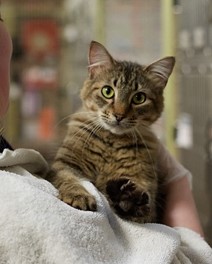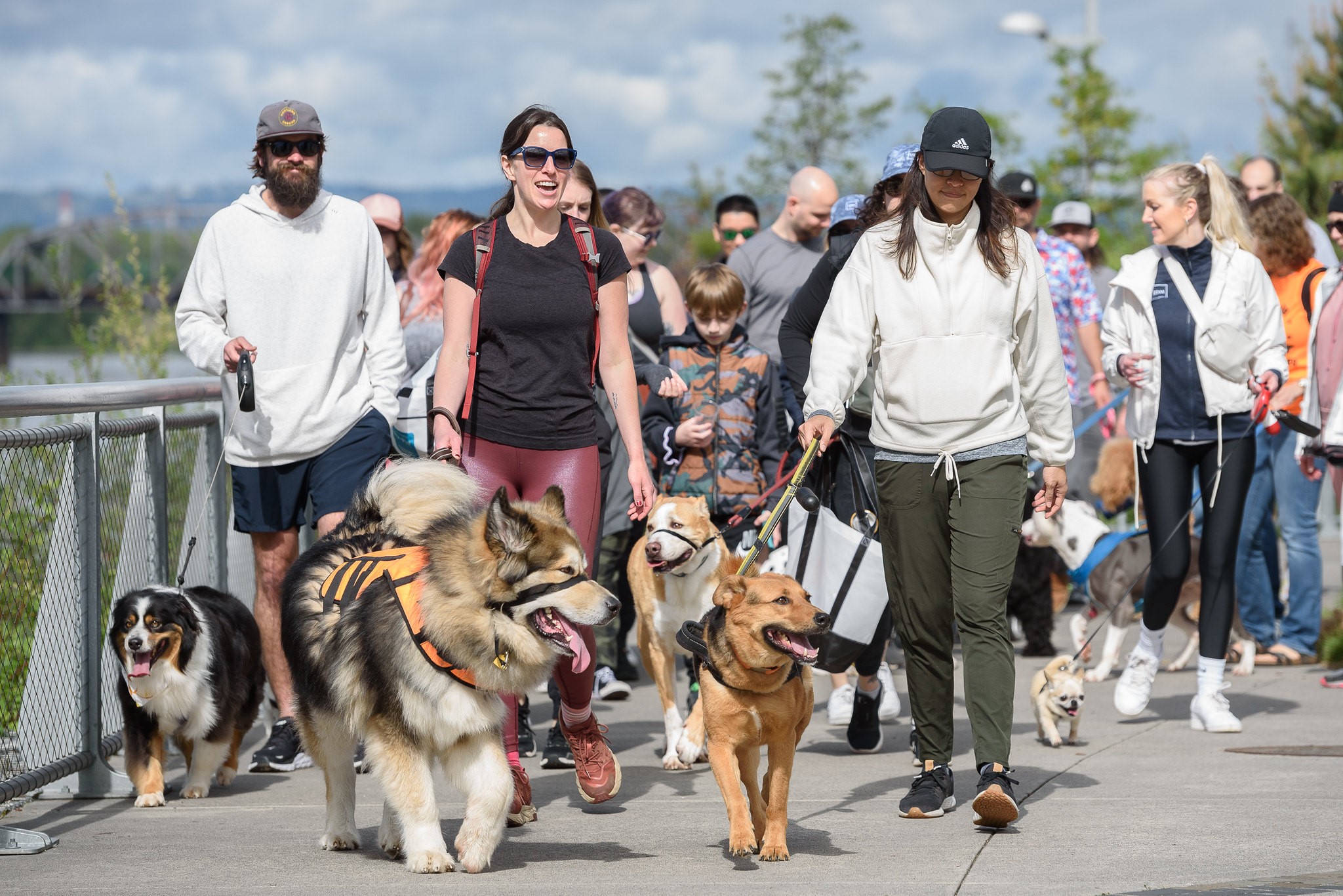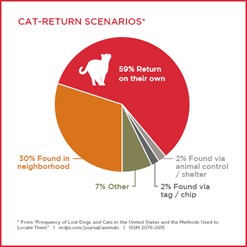
WAG Newsletter | March 2024
Let's Talk about Cats!
You see a cat outside… what do you do? Well, the answer depends on several factors. But the right answer is rarely “bring it to your local shelter.”
Pet Cats vs Community Cats vs Feral Cats
Before we can talk about actions you can take when you see a cat outside, it’s helpful to first break down some terminology. In general, the domesticated cat population falls into three buckets:
- Pet Cats: They live in our homes, give us love, and boss us around. We scoop their litter boxes, feed them, and socialize them. They're accustomed to living indoors and appreciate companionship with people. In most cases, they're reliant on us for food and care.

- Community Cats: Their comfort level with people will vary. They may be friendly, social, and reliant on human caregivers for shelter and/or food, or they may be self-reliant and rarely social with humans. Community cats may have once had a family or lived an indoor life, but they have adapted to outdoor life and prefer it.
- Feral Cats: Fearful of people, feral cats are unsocialized. They're unlikely to adapt to the life of a typical family pet. Being in a shelter is often traumatizing for a feral cat, and behavior modification to help them adapt to living inside is rarely successful and can often result in more problematic behaviors. The humane option for feral cats is to allow them to continue living outdoors.
Most Cats Shouldn’t Come to the Shelter
That may sound like an alarming statement, so let's unpack it. And first, one thing is always true at HSSW: if a cat or kitten is sick or in danger, bring them to us so we can help. But for healthy cats, there’s not an easy, single answer.
Throughout the year, it's common for us to meet or even exceed our available space for cats - especially from late spring through early fall during kitten season. (Our cat intake status is always listed on our website) When you bring an otherwise healthy stray cat to the shelter, that means less space and fewer resources for sick or injured cats and kittens who truly need help.
But space and resources aren’t the only reason. For community cats and feral cats, being in the shelter can be traumatizing and have a serious detrimental effect on their behavior and well-being. For many of them, their only placement options are as a barn cat or working cat, and demand for that type of adoption is low. And in a shelter environment, it's impossible to provide appropriate conditions for behavioral rehabilitation and socialization. It's safer for our entire feline community to keep stray and feral cats out of the shelter.
Stop "Helping" Cats when They Don't Need It
We can hear you asking: "what about lost cats?" A lost cat is one who has become separated from their family. And while these cats need to be reunited with their family, they usually don't need your help to do so. In fact, snatching that cat and bringing it to your local shelter may actually reduce the chance of them returning home.
Recent studies have shown that lost cats are 10-50 times more likely to find their way home if they stay where they are instead of being brought to the shelter (Source: National Animal Care & Control Association).
Breaking down the data for lost cats who return home:
- Returned on their own: 59%
- Found in their neighborhood: 30%
- Found because of a tag/microchip: 2%
- Found via animal control/shelter: 2%
- Other: 7%
With a return rate of only 2% of cats who enter the shelter, it's clear that cats are more likely to reconnect with their family outside of the shelter environment (source: MDPI Journal).
How you Can Help Lost Cats
The best thing you can do for a cat who might be lost is help them find their way home without bringing them to HSSW. Not only are its chances of connecting with its family increased, it allows us to prioritize space for pets who need our help.
- Ask your neighbors - The cat may be an indoor-outdoor cat who likes to roam the neighborhood. You may think it's lost and in need of help when it's actually just going about its routine.
- Found Pet Reports – If a cat is staying with you in your home or on your property, you can complete a found pet report and the cat will be listed as on the Found Pets in our Community page of our website.
- Try social media - Tools like neighborhood Facebook groups, NextDoor, Craigslist, and others can be great ways to help cats without unnecessarily displacing them. Get a good photo of the cat and ask your local network!
- Check for ID - If the cat has a collar, check to see if there's a tag with an owner's phone number. Or, if the cat is amenable, take it to your neighborhood vet and scan for a microchip.
- Paper collars - A simple and easy option, paper collars can be a great way to attempt to locate the owner of a pet who visits your property. Here's an example.
More Resources
While many cats found roaming are harmless, we also understand they are not always welcome at your home or property. You can find tips for deterring outdoor cats on our Community Cats page.
You'll find great resources and information from our friends at Feral Cat Coalition of Oregon, providing information and resources for communities in the Portland Metro Area including Southwest Washington. And you'll also find excellent resources and more general information about community cats from Alley Cat Allies.
A Year in Review - Annual Report 2023
 The numbers are in and 2023 was a record-breaking year in Southwest Washington. We served more than 10,000 pets in our community last year.
The numbers are in and 2023 was a record-breaking year in Southwest Washington. We served more than 10,000 pets in our community last year.
We are here every day to support pets with shelter and lifesaving medical care, and to help them find a loving home. But the scope of our work is broader than what happens here at the shelter – and if we are to truly help the pets in our community, we must also support the people who care for them and invest in programs that keep pets and people together.
Learn more about our work in the community and how we make a difference for the animals every day.
Walk/Run - Our Largest Pet-Friendly Fundraiser
Sure it's an opportunity to walk or run with your dog, but the biggest impact of Walk/Run for the Animals is the fundraising! Every walker and runner, every team, and every individual fundraiser makes our work with the animals possible. In 2023 we made an impact on more animals than ever before - and support from events like Walk/Run make that possible. So lace up your shoes, rally your pack, and join us as we raise $300k to support pets in need! 
How to get started
- Register now and kickstart your journey to supporting pets in our community. Save with early-bird pricing, only $35!
- Join a team or lead your own pack – because Walk/Run is always better with friends by your side!
- Set your fundraising goal high and rally your community behind you. Together, let's make a difference for pets in need!
If lifesaving impact isn't enough incentive for you, you'll also earn some great prizes as your fundraise. We'll unveil our fundraising prizes soon, so get an early start now and snag some cool swag along the way. And if you're into unique gear, when you start your own team you earn a "Pack Leader" hat reserved only for team captains!
Join us May 4 at the Downtown Vancouver Waterfront for the 33rd annual Walk/Run for the Animals! Help us make strides for healthy and happy pets in our community.
HSSW Newsletter
Want to stay in the loop with what's happening at HSSW? Click the link below to sign up for our monthly newsletter and other HSSW updates. We'll see you in your inbox!

